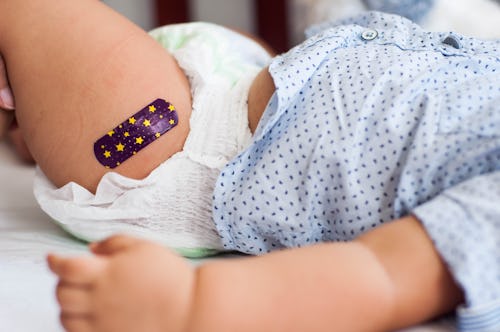
Summer may be in full swing, but cold, flu and yes, the dreaded season Respiratory Syncytial Virus more commonly known as RSV season. While almost all children will contract RSV by time they’re 2, according to the Centers of Disease Control and Prevention (CDC), up to 80,000 children under 5 are hospitalized with the virus annually. In July of this year, the U.S. Food and Drug Administration (FDA) approved nirsevimab (brand-name Beyfortus), a monoclonal antibody that can prevent RSV in toddlers and infants. CDC approval came quickly after that in early August, and earlier this week, the American Academy of Pediatrics (AAP) released a statement calling for all infants under 8 months of age to receive one dose of nirsevimab before RSV season picks up. The AAP also included acknowledgement of limited access as the rollout begins, saying in their statement:
“The AAP has called for a comprehensive strategy to ensure equitable access to nirsevimab in hospitals, birthing centers and ambulatory practice settings. Currently, there is not the infrastructure in place to ensure all children can access the product, which Dr. Chung called “alarming.” Without significant structural changes, families living in lower-income and under-resourced communities, as well as those with infants at greatest risk for severe RSV illness, may face challenges accessing it.”
In light of these anticipated and “alarming” access issues, the AAP calls for continued use of palivizumab, another monoclonal antibody treatment for RSV that is given in a series of doses.
What is RSV?
RSV is a lower respiratory tract disease. Symptoms in children include runny nose, decreased appetite, coughing, sneezing, irritability, and sometimes a fever. While the vast majority of cases pass without incident, for some young children and the elderly, it can be serious and even dangerous, leading to pneumonia and bronchiolitis. Those at greatest risk for severe illness from the virus include preemies, infants under 6 months old, children under 2 with co-morbidities such as lung or heart disease, and children with weakened immune systems.
What is nirsevimab and how does it protect babies from RSV?
Developed by AstraZeneca and Sanofi, nirsevimab is not a vaccine, but a monoclonal antibody given via injection. These laboratory-made proteins work by mimicking the immune system’s ability to fight off harmful pathogens such as viruses. The FDA says that one dose of Beyfortus (given as an injection) prior to RSV season may provide significant protection during the course of the season, which typically begins in fall before peaking in the winter, according to the CDC.
Development of this antibody was fast-tracked by the FDA after a disconcerting surge of RSV-related hospitalizations last year, particularly among very young children and the elderly. Safety was evaluated in three different trials involving nearly 4,000 children from preterm infants to toddlers up to 2 years old. While side effects were observed, they were rare and mild, and the FDA determined that it can be beneficial to newborns and infants born during or entering their first RSV season, and in children up to 24 months of age who remain vulnerable to severe RSV disease.
“RSV can cause serious disease in infants and some children and results in a large number of emergency department and physician office visits each year,” John Farley, M.D., M.P.H., director of the Office of Infectious Diseases in the FDA’s Center for Drug Evaluation and Research, said in a statement. “Today’s approval addresses the great need for products to help reduce the impact of RSV disease on children, families and the health care system.”
0 comments:
Post a Comment